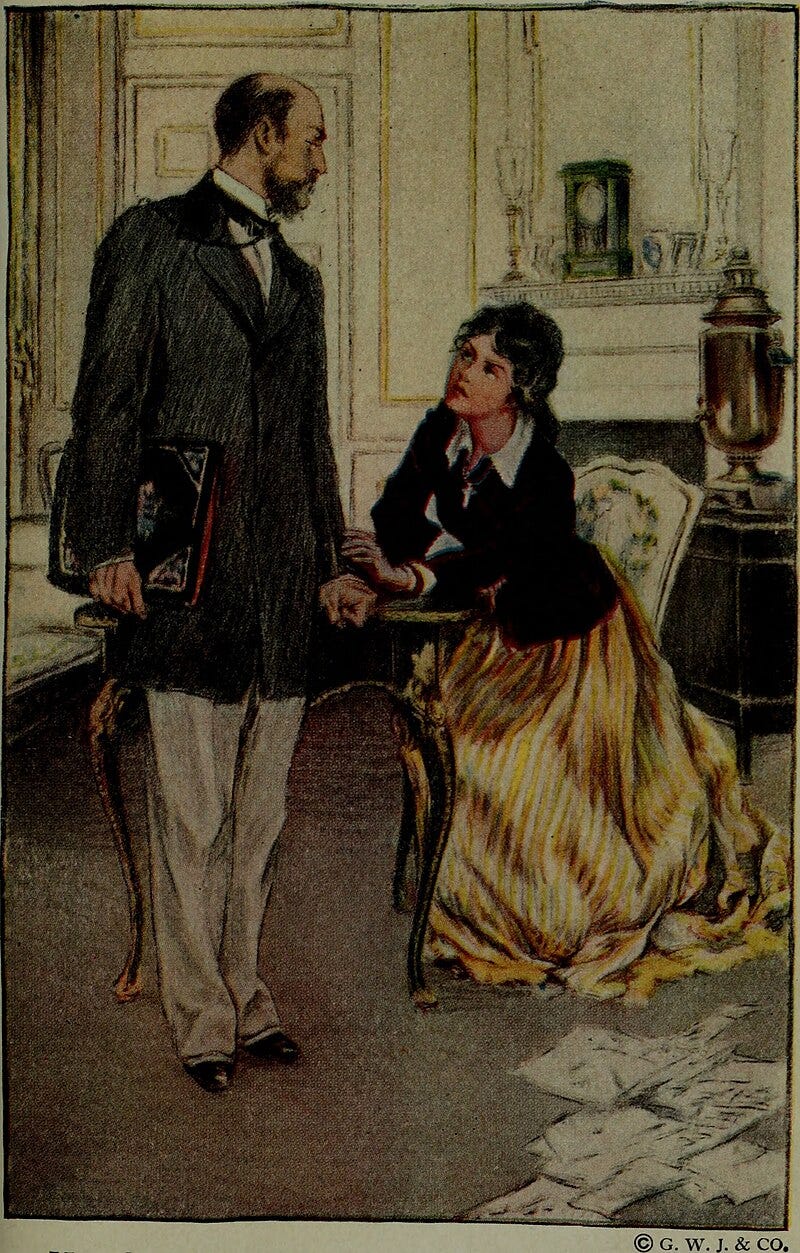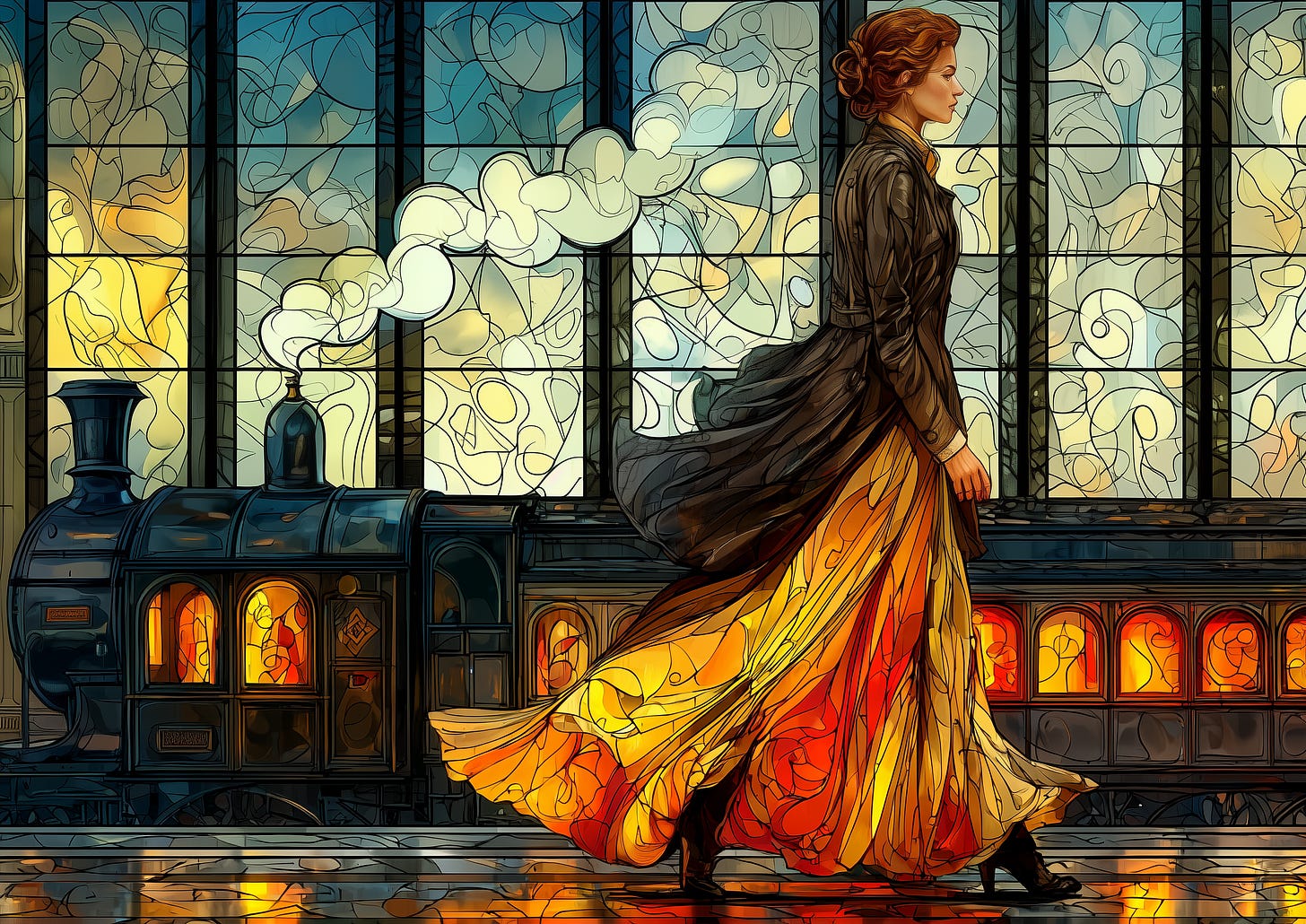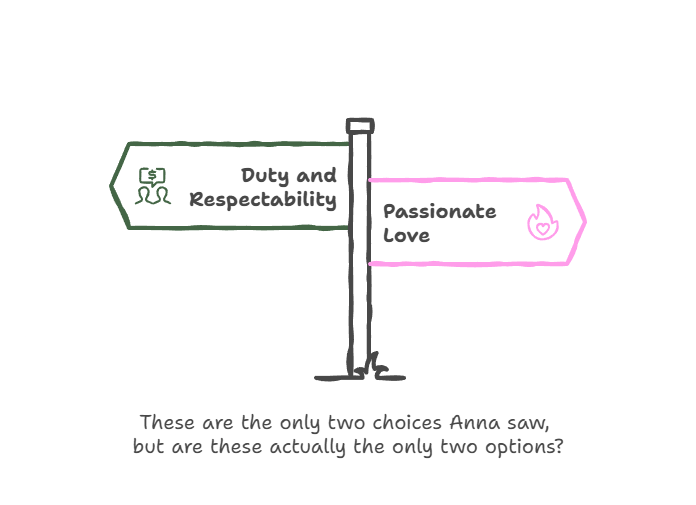Why Anna Karenina Had to Die (And How She Could Have Lived)
The Question That Changes Everything - Article 3
This is the third article in our series where we analyze great stories through the lens of Values-Needs Theory - examining how understanding the question “What need are they trying to meet?” reveals hidden patterns in literature’s most enduring characters. If you’ve missed any, you’ll find a list of all the articles in the series at the end of this article.
Anna Karenina didn’t die because she made the wrong choice. She died because she never knew she had one.
It’s tempting to think of Anna’s story as a tragedy of bad options. She could have stayed with her cold, bureaucratic husband Karenin and lived a respectable, miserable life. Or she could run away with her passionate lover Vronsky and face social exile. She chose Vronsky, lost everything, and threw herself under a train.
There’s more to it though, if you study this story through the lens of my values-needs theory: Anna wasn’t actually choosing between two options. She was trapped between a fundamental human need and an inherited value she’d never consciously examined—and she didn’t even know that values could be examined, let alone changed.
The real tragedy of Anna Karenina isn’t that she chose love over duty. It’s that she never realized that while her need for love was real, both the romantic ideals around ‘love’ and the social expectations around ‘duty’ were packages of beliefs someone else had handed her—beliefs she could have unwrapped to see what was actually inside.
The Hidden Conflict Anna Couldn’t See
Think about Anna’s situation. She’s married to a man twenty years older, in an arrangement made by her family when she was barely more than a child. For years, she dutifully plays her assigned role: devoted wife, loving mother, perfect society hostess.
Then she meets Vronsky at a train station, and everything changes. For the first time in her life, she experiences what authentic love and connection feel like.
But here’s what Anna didn’t realize: she wasn’t facing a choice between two options. She was caught in a conflict between a fundamental human need and an inherited value she’d never consciously examined.
Her Need: Love, authentic connection, emotional intimacy - not just romantic love, but the deep human need to be seen, understood, and valued for who she actually was rather than the role she performed.
Her Inherited Value: Duty above all else - the belief that “good wives endure whatever is necessary for family stability,” that “honorable women sacrifice personal happiness for social order,” that “decent mothers never put their own needs before their children’s legitimacy.”
The crucial thing is this: Anna wasn’t aware she was operating from this inherited duty value. She thought duty was just... reality. Like gravity. She had no idea it was actually a choice someone else had made for her.
So in her mind, there were only two possibilities:
Option 1: Honor her duty (which felt like natural law). Stay with Karenin. Accept that her need for love would never be met.
Option 2: Abandon her duty (which felt like becoming a monster). Leave with Vronsky. Meet her need for love but destroy her son and herself in the process.
Stay and be miserable, or leave and destroy everything. Those were the only choices she could see because she couldn’t see that “duty above all else” was actually a value she could examine, modify, or replace.
The Unconscious Values Trap
Here’s what Anna never questioned: Where did those values come from in the first place?
The value that said “good wives endure loveless marriages” - who decided that? The belief that “passionate love is worth any sacrifice” - where did she learn that? The assumption that “mothers who leave are monsters” - whose voice was that in her head?
Anna operated from what I’m calling unconscious inherited values. These are beliefs about what’s right, important, or necessary that we absorb from family, society, and culture - but we never consciously choose them. They just feel like “how things are.”
Here’s the crucial insight: When values are unconscious, they feel as fixed and unchangeable as fundamental human needs.
Anna felt trapped because, in her mind, she HAD to be either the dutiful wife or the passionate lover. These weren’t choices - they were forces of nature. Like gravity or the need for air.
While love and connection is actually a human need that can’t be changed, she inherited romantic beliefs about how love should work—that ‘true love conquers all,’ that passion justifies any sacrifice—from Romantic literature that glorified feeling over everything else. She also inherited the value that ‘good wives sacrifice their happiness for their families’ from a society that needed women to stay in marriages regardless of fulfillment. Neither her values around duty nor her beliefs about how to pursue love were consciously chosen. They were cultural programming she’d never examined.
And because she was unconscious of them, she couldn’t change them, modify them, or find creative alternatives.
What Anna Never Learned to Ask
What if, in that moment of crisis, someone had asked Anna the question that changes everything: “What need are you trying to meet?”
Not “What should you do?” or “What’s the right choice?” but “What do you actually need?”
If Anna had been helped to dig beneath the surface to her actual needs, she might have identified:
A need for authentic love and emotional intimacy
A need to be seen and valued for who she really was, not just her role
A need for agency and choice in her own life
A need to protect her relationship with her son
Then the crucial follow-up: “What values are you operating from? Not what you were taught to value, but what YOU actually believe is important?”
This is where Anna’s unconsciousness becomes clear. She couldn’t have answered this question because she didn’t know she was operating from inherited values. The “duty above all else” belief felt like reality, not a choice.
But imagine if someone had helped her recognize: “Anna, that voice saying you MUST sacrifice your happiness for duty - where did that come from? Is that actually YOUR value, or is it something your family and society programmed into you?”
If she’d been able to see that “duty above all else” was an inherited belief rather than natural law, she could have asked: “What would I choose to value if I got to pick?”
Maybe:
She valued her child’s wellbeing, but with the understanding that sacrificing herself needlessly would destroy that wellbeing
She valued authenticity, but also kindness
She valued her own happiness, but in a way that didn’t destroy others
She valued commitment, but to relationships that were mutual and life-giving
And then: “Given what I actually need and what I actually choose to value - rather than what I inherited - what creative options exist?”
This is where the real tragedy becomes clear. Anna never got to this question because she had no idea she was following an inherited script.

The Path Anna Never Found
What might have happened if Anna had learned to separate her actual needs from her inherited values and beliefs about how to meet those needs?
Once she could see that “duty above all else” was programming rather than reality, she could have brainstormed creative solutions that honored both her need for love AND a consciously chosen value of protecting her son.
But remember—Anna could only see two options because she was trapped in unconscious values. If she’d become conscious of those values, suddenly a whole range of possibilities would have opened up:
Option 3: She could have had an honest conversation with Karenin about the deadness of their marriage, seeking a mutual separation that preserved dignity and her relationship with her son.
Option 4: She could have recognized that her attraction to Vronsky was partially about rebelling against unconscious duty values, and focused instead on creating authentic connection in other relationships - friendships, motherhood, maybe even finding ways to bring more genuine intimacy to her marriage.
Option 5: She could have chosen to honor her commitment to Karenin while also choosing a different value around duty - perhaps “I value commitment that includes honest communication about needs” instead of “I value duty that requires suffering in silence.”
Option 6: She could have delayed any major decisions while she explored what authentic relationship looked like, giving herself time to separate rebellion against inherited values from genuine love.
The point isn’t that any of these would have been easy or perfect. The point is that she never even knew they existed because she couldn’t see the difference between her needs (which were real) and her inherited values (which were choices someone else had made for her).
Instead, she stayed trapped in unconscious operation - feeling controlled by beliefs she didn’t know she could examine - until desperation drove her to the train tracks.
Your Own Inherited Values
Before we feel too superior to Anna, let’s be honest: How many of us operate from unconscious inherited values, or from inherited ideas around needs?
That voice in your head saying you “should” stay in the job that’s killing you - where did that come from? The belief that “good parents sacrifice everything for their children” - who taught you that? The assumption that you “can’t” change careers at 40, or move across the country, or end a relationship that stopped working - whose rule is that?
Most of us carry inherited values from:
Our family of origin (”This is how our family handles money/relationships/conflict”)
Our culture (”This is what success looks like”)
Our generation (”This is how people our age are supposed to behave”)
Our gender, race, class (”This is what people like us do”)
And here’s the thing: inherited values feel absolutely real and unchangeable. Just like Anna’s values felt to her.
The colleague who stays in a toxic job because ‘good employees don’t quit’ - is this their conscious choice or unconscious programming? The parent drowning in activities because ‘involved parents do everything for their kids’ - examined value or inherited belief? The person who won’t pursue dreams because ‘responsible adults don’t take risks’ - deliberate decision or unquestioned inheritance?
Most of the time, we haven’t actually examined these beliefs. We’re operating from unconscious inheritance. But the only way to know is to ask ourselves: Did I choose this, or did I inherit it?
We feel trapped by what we think we “have to” do, never realizing that most of those “have to’s” are actually inherited beliefs we could examine and potentially change.
The Question That Could Save Lives
Here’s what is tragic about Anna’s story: one conversation could have changed everything.
If someone had helped her recognize that her values were choices rather than laws of nature... if someone had helped her separate her actual needs from society’s expectations... if someone had shown her that the choice between “dutiful wife” and “passionate lover” was a false binary created by unconscious inheritance...
She might have lived.
Not just survived - actually lived. As someone making conscious choices about her own values rather than someone acting out unconscious programming.
This is Element 4 of the values-needs framework I’m developing: Most people operate from unconscious inherited values that feel as fixed as fundamental needs. We think we “have to” live according to beliefs we never chose. We feel trapped by “shoulds” that aren’t actually ours.
But here’s the hopeful part: the moment you become conscious of a value, it transforms from something fixed into something you can choose.
Anna’s tragedy was that she never experienced this transformation. Her values stayed unconscious - and therefore felt unchangeable - until the day she died.
Breaking Free From Your Own Scripts
So here’s your assignment for this week: Notice your “shoulds.”
When you hear yourself thinking “I should...” or “I have to...” or “People like me don’t...” - pause. Ask yourself:
“Did I choose this value, or did I inherit it?” “If I got to pick what matters to me, what would I actually choose?” “What need am I trying to meet with this ‘should,’ and are there other ways to meet it that honor both my needs and what I actually value?”
You might be surprised by what you discover. That belief that you “should” work 60-hour weeks might be inherited from a parent who equated worth with productivity. That assumption that you “can’t” ask for what you need in relationships might come from growing up in a family where direct communication felt dangerous.
The goal isn’t to throw out every inherited value - some of them might be genuinely yours when you examine them. The goal is to move from unconscious inheritance to conscious choice.
To transform your values from things that control you into things you decide.
The Life Anna Could Have Had
I imagine Anna, in this alternative story, having that crucial conversation. Learning to ask “What need am I trying to meet?” Learning to separate her needs from society’s expectations. Discovering that she could examine and modify the values that felt so fixed.
Maybe she would have chosen to leave Karenin anyway - but consciously, with a plan that protected her son and allowed her to maintain some connection to him. Maybe she would have chosen to work on her marriage, but from a place of agency rather than duty. Maybe she would have chosen something entirely different - a life focused on work, or art, or helping other women trapped in similar situations.
We’ll never know. But I know this: she would have lived as herself rather than as someone acting out inherited scripts.
And ultimately, that’s what values-needs alignment is about. Not finding the “perfect” life, but living consciously. Making your own choices about what matters to you, rather than following programming you inherited from others.
Anna Karenina died because she never learned she could choose.
You can choose.
Next: “The Green Light Wasn’t the Problem: Gatsby’s Fatal Misidentification” - exploring what happens when we misidentify which need we’re actually trying to meet.
Have you ever recognized an inherited “should” in your own life? What happened when you questioned whether you actually chose that value? I’d love to hear about your own experiences with discovering the difference between inherited and chosen values.
All articles in the One Question Series:
1 - The One Question That Explains Every Tragic Hero
2 - Why Jean Valjean’s Bread Theft Explains Human Behavior
3 - Why Anna Karenina Had to Die (And How She Could Have Lived)
4 - The Green Light Wasn’t the Problem: Gatsby’s Fatal Misidentification
5 - The Psychology of Breaking Bad: How Walter White’s Ego Built an Empire


